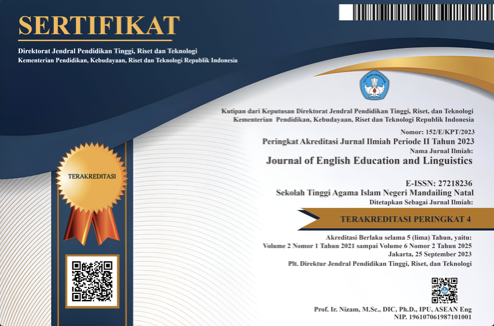The Factors Influence Students’ Fears In Practicing English Conversation In Front Of Class
DOI:
https://doi.org/10.56874/jeel.v4iJournal%20of.1195Keywords:
Factors; influences; fears, practice; English conversation.Abstract
Speaking skill is one of the most important skills in learning a language. This skill requires language learners to produce utterances or utterances through speech media. When someone studies a language, it is very necessary to be able to practice the pronunciation of that language so that they are able to produce a good language. Therefore, this study aims to analyze the factors that influence students' fear in practicing English conversation in front of the class when carrying out English learning. The method used in this research is qualitative by using a descriptive approach. The sample in this study were 36 students who were learning English. Data was obtained through observation and interviews to find out in-depth perceptions and opinions about the factors that make students feel afraid when carrying out conversational practice in front of the class. After the data is collected, the data is analyzed through three stages, namely data reduction, data display and conlusion. The research results show that there are two factors; internal and external influences that affect students' fear when practicing conversation in front of the class. Internal factors include not feeling confident, not daring, afraid of being wrong, embarrassed, not fluent in conveying an utterance, while external factors include an unsupportive classroom environment including distraction from friends, not having enough understanding of words or vocabulary in English, getting negative responses, for example being laughed at or ridiculed, and not having friends or partners to practice English conversation with.
References
Amrullah, A. Z. (2019). Developing language games to teach speaking. JEELS by IAIN Kedir, 2(Man 2), 13–33. https://jurnal.iainkediri.ac.id/index.php/jeels/article/view/94
Andas, N. H. (2020). Students’ speaking problem at the fourth semester of English study program in Sembilanbelas November Kolaka. ELT Worldwide: Journal of English Language Teaching, 7(1), 1. https://doi.org/10.26858/eltww.v7i1.12359
Arora, R., & Stoner, C. . (2009). A mixed method approach to understanding brand personality. Journal of Product & Brand Management, 18, 272–283.
Bogodad, N. U., Mappewali, A., & Thamrin, N. S. (2021). A study on students’ anxiety in speaking English. Journal of Foreign Language and Educational Research, 4(2).
Bohari, L. (2020). Improving speaking skill through small group discussion at eleventh grade students of SMA Plus Munirul Arifin Nw Praya. Journal of Languages and Language Teaching, 7(1), 68. https://doi.org/10.33394/jollt.v7i1.1441
Cresswell. (2013). Research design: Qualitative, quantitative, and mixed methods approaches. Sage Publication.
Ersan, M., Kurnia, F. D., & Fadilah, E. (2022). Improving students’ speaking ability using vlog media at SMK Negeri 1 Arjasa. Budapest International Research and Critics Institute (BIRCI-Journal), 5646–5656. https://doi.org/10.33258/birci.v5i1.4271
Miles, M. B., Huberman, A. M., & Saldana, J. (2013). Qualitative data analysis: A methods sourcebook. Sage Publications Incorporated. https://doi.org/https://doi.org/10.1080/10572252.2015.975966
Prayudha, J., & Malik, A. A. (2021). Efektivitas komunikasi terhadap proses belajar dalam pembelajaran online. DAWUH: Islamic Communication Journal, 2(1), 33–40.
Prayudha, J. S. (2021). Students problems face in online learning amidt pandemic. Acitya: Journal of Teaching & Education, 3(2), 2021. http://journals.umkt.ac.id/index.php/acitya
Prayudha S., J. (2021). Video based learning as a media for teaching English during pandemic covid-19. Journal of Language Intelligence and Culture, 2(1), 1–11. https://doi.org/10.35719/jlic.v2i1.53
Prayudha & Pradana. (2023). Integrating information communication technology in English language teaching. JEEYAl: The Journal of English Teaching for Young and Adult Learners,2(1) 29–35.
Prayudha, Nabila & Pradana, A. (2023). An analysis of students’ difficulties in English conversation practice. JEEYAL: The Journal of English Teaching for Young and Adult Learner, 2(3), 215–222.
Prihamdani, Depi. (2020). Meningkatkan kemampuan bicara berbahasa Inggris mahasiswa dalam mendeskripsikan suatu kegiatan dengan menggunakan model pembelajaran presentation practice produce (PPP). Jurnal Sekolah Dasar, 4(2). https://doi.org/10.36805/jurnalsekolahdasar.v4i2.961
Sugiyono. (2014). Memahami Penelitian Kualitatif. Alfabeta.
Tahe, A. (2021). The problems of Thai students in mastering English speaking skills in the Islamic university of Lamongan. E-LINK JOURNAL, 7(2). https://doi.org/10.30736/ej.v7i2.332
Downloads
Published
Issue
Section
License
All articles published in the Journal of English Education and Linguistics are licensed under a Creative Commons Attribution-ShareAlike 4.0 International (CC BY-SA) license. This means anyone is free to copy, transform, or redistribute articles for any lawful purpose in any medium, provided they give appropriate attribution to the original author(s) and Journal of English Education and Linguistics, link to the license, indicate if changes were made, and redistribute any derivative work under the same license.
Copyright on articles is retained by the respective author(s) without restrictions. A non-exclusive license is granted to the Journal of English Education and Linguistics to publish the article and identify itself as its original publisher, along with the commercial right to include the article in a hardcopy issue for sale to libraries and individuals.
Although the conditions of the Creative Commons Attribution-ShareAlike 4.0 International (CC BY-SA) license do not apply to authors (as the copyright holder of your article, you have no restrictions on your rights), by submitting to the Journal of English Education and Linguistics, authors recognize the rights of readers and must grant any third party the right to use their articles to the extent provided by the license.

This work is licensed under a Creative Commons Attribution-ShareAlike 4.0 International License.








